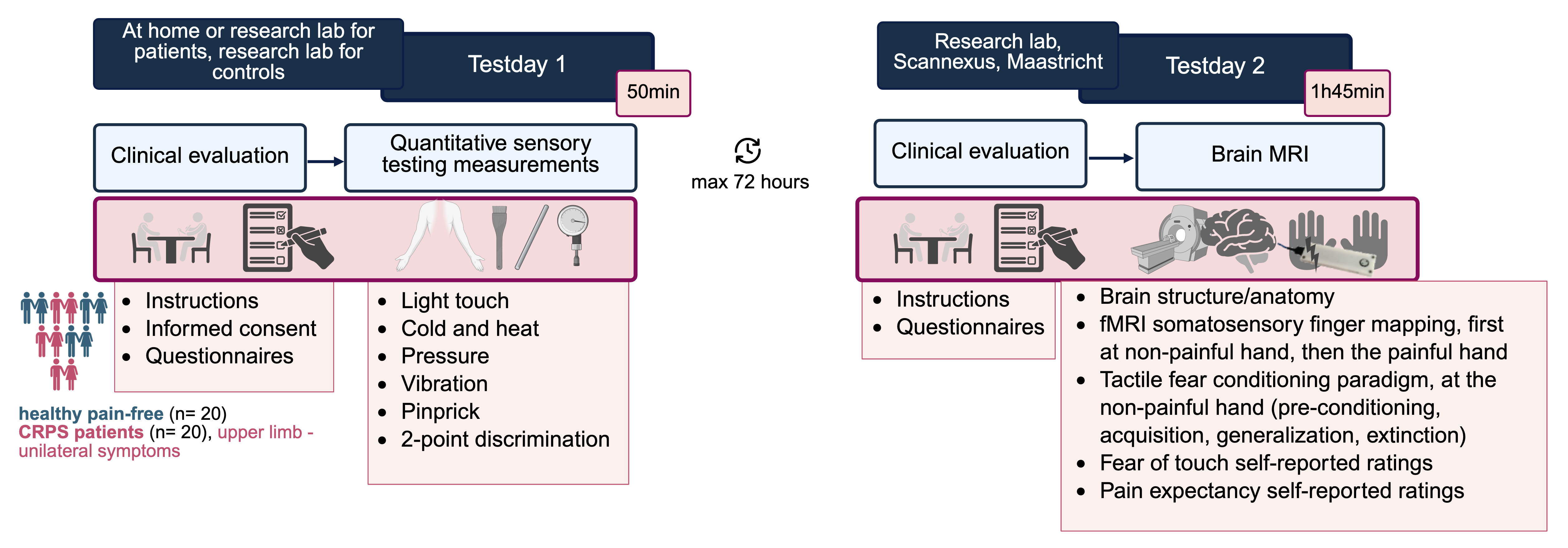FABrIC | Imaging fear of painful touch
Imaging fear of painful touch: unraveling relationships between neural correlates of pain-related fear, somatosensory neuroplasticity, and sensory impairments in the context of chronic pain. A Marie Curie financed study by Iris Coppieters for the Experimental Health Psychology research group at the Faculty of Psychology and Neuroscience at Maastricht University.
The abstract | the experiment | the team
The abstract
Chronic pain affects approximately 20% of people worldwide leading to enormous personal suffering and economic burden. A key factor contributing to chronic pain disability that thus far has been neglected is fear of painful touch – a core symptom in people with complex regional pain syndrome (CRPS). FABrIC (FeAr of painful touch in the BraIn in Chronic pain) is a functional Magnetic Resonance Imaging (fMRI) study using a novel tactile fear conditioning paradigm that we developed. We will use this novel tactile fear conditioning paradigm to examine the neural correlates of the acquisition, generalization, and extinction of fear of painful touch and interrelationships with somatosensory neuroplasticity, and sensory impairments (i.e., abnormalities in processing of somatosensory stimuli) in individuals with CRPS (n = 20) compared to healthy controls (n = 20). This Marie Skłodowska-Curie Actions (MSCA) project is groundbreaking and can yield novel insights in hypothesized intertwined underlying neural mechanisms of pain-related fear (learning) and symptoms. We hypothesize impaired threat-safety learning, excessive fear generalization, and slower extinction in patients with CRPS compared to controls. This compromised fear learning will relate to changes in neural correlates of fear of touch in patients compared to controls. The intertwined neural mechanisms include a hypothesized relationship between changes in the representation of the fingers in the primary somatosensory cortex (S1) in individuals with CRPS (i.e., somatosensory neuroplasticity) and fear generalization. More specifically, we hypothesize that somatotopic imprecision (i.e., overlap) in finger representations in S1 will be related to reduced tactile acuity and excessive fear generalization (i.e., broader generalization gradients of fear of painful touch). In addition, we will investigate whether individual differences in vulnerability and resilience factors can modulate fear learning and whether they affect pain-related outcomes (e.g., pain severity).
Our project uniquely brings together pain researchers from physiotherapy, neuroscience, and psychology fields, offering potential of strong clinical relevance and translations and new avenues for improved treatment based on newly gained insights. We will go beyond the state-of-the-art to study this complex chronic pain condition and provide opportunities to alleviate CRPS stigma and increased recognition of the impact of fear of touch. Persons with CRPS endorsed the relevance of this project. We will perform for the first time the tactile fear conditioning paradigm in chronic pain patients in an fMRI environment and postulate that unique learning mechanisms play a role in fear of painful touch. By performing the paradigm on the non-affected hand in patients with unilateral symptoms, we can assess in a feasible way whether general fear of touch learning deficits are present.
The experiment
Our study will include two sessions on two test days (preferably max 72 hours in between, and within one week). The first session will take approx. 50 minutes, and the second session maximum 1 hour and 45 minutes.
The first session will include filling out questionnaires by the participants, and performing quantitative sensory testing (QST) measurements by the researcher at the non-painful and painful upper limb. The second session will include questionnaires, the structural T1-weighted anatomical brain MRI scan, performing an fMRI finger mapping run first with vibrotactile stimulations at the non-painful hand, then the finger mapping run with stimulations at the painful hand, and performing a fMRI scan using the tactile fear conditioning paradigm with stimulations at the non-painful hand (pre-conditioning, acquisition, generalization, and extinction phase of task-based fMRI). Please the image below consult for an overview of the study design, and below for further methodological details. For the healthy pain-free persons the procedures will also take place at both upper limbs, and at a matched side with a patient for the tactile fear conditioning paradigm.
All procedures are specifically performed for this study and no diagnostic procedures or treatment will be postponed, although stability of medication and treatment will be asked and reviewed during the course of the study (the period in which the testing days take place). No invasive procedures will take place.

The team
Dr. Iris Coppieters
Principal Investigator
Prof. dr. Ann Meulders

Prof. dr. Inge Timmers

Dr. Emma Biggs
